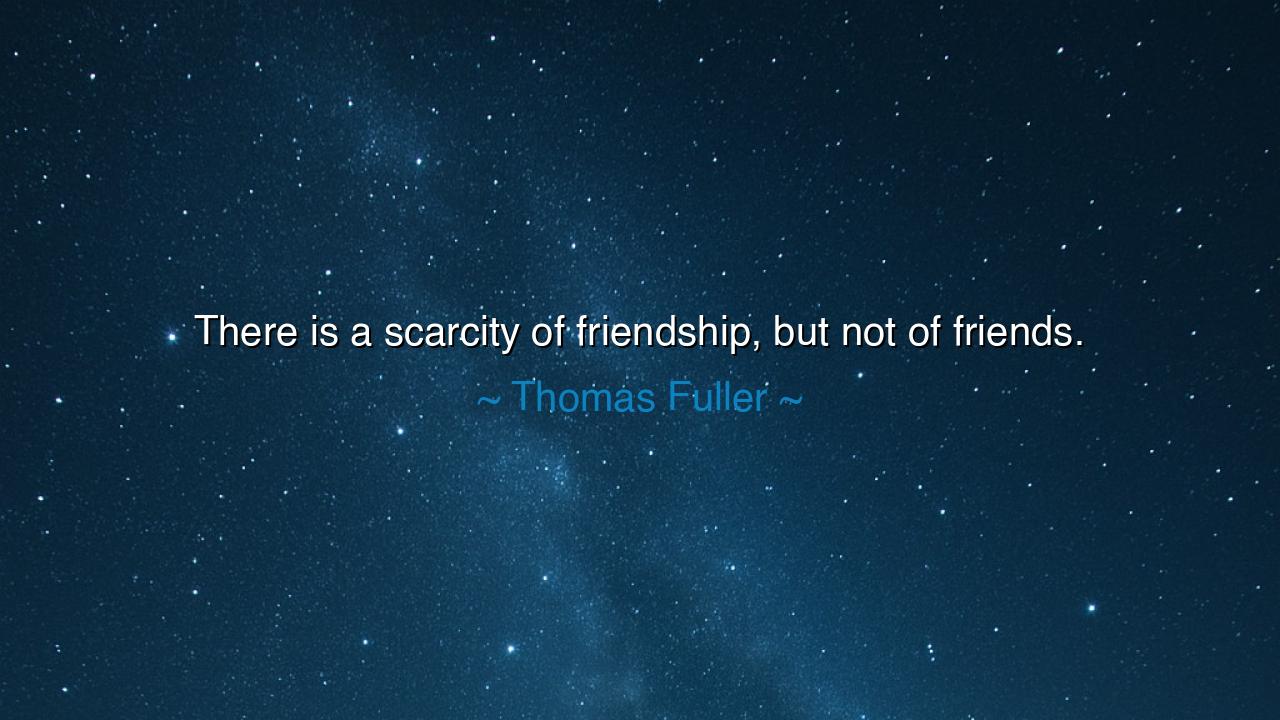
There is a scarcity of friendship, but not of friends.






"There is a scarcity of friendship, but not of friends." These profound words by Thomas Fuller offer a reflection on the very nature of friendship and the human condition. Fuller, with his keen understanding of human nature, speaks of a scarcity that does not lie in the quantity of friends—for it is not difficult to find many who call themselves friends—but in the depth of true friendship. In today’s world, as in his own, we find that while we may be surrounded by people who offer us their company or claim to be our friends, true friendship—the kind that is steadfast, loyal, and enduring—remains a rare and precious gift. It is this scarcity that Fuller points to, reminding us that while we may have friends, we may not always have the friendship we deeply desire and need.
In the ancient world, friendship was considered a sacred bond. The Greeks, especially Aristotle, viewed friendship as one of the highest virtues, one that transcended mere companionship or mutual benefit. For Aristotle, friendship was based on shared values, virtue, and a mutual commitment to growth. But even in his time, he acknowledged that such friendships were rare. The relationships he esteemed the most were those forged in mutual respect and loyalty, where the well-being of the other was as important as one's own. These kinds of friendships were not easily found, for they required a depth of character and commitment that went beyond casual acquaintance. In this light, Fuller’s words echo the ancient truth: while we may have many friends, true friendship is much harder to come by.
One can look to the story of David and Jonathan in the Bible, which serves as an example of the kind of friendship Fuller speaks of. Jonathan, the son of King Saul, and David, the future king of Israel, shared a bond that was not based on self-interest or mutual gain, but on trust, loyalty, and sacrifice. Their friendship was forged in the crucible of conflict, where Jonathan stood by David even though his own father, Saul, sought to destroy him. Jonathan’s unwavering support, despite the dangers it posed to his own position and future, exemplifies a rare friendship—the kind of friendship that Fuller suggests is scarce. It was not a friendship born of convenience or pleasure, but one that required great personal sacrifice, loyalty, and love. Their friendship is a beacon of the deep and abiding bonds that Fuller refers to, showing us that while friends may be many, such friendships are few.
Similarly, in the life of Socrates, we see the contrast between the abundance of friends and the scarcity of true friendship. Socrates was surrounded by many followers, some of whom admired him for his wisdom, others who sought his approval or companionship. Yet, his true friends, like Plato, were those who saw him not just as a teacher or philosopher, but as someone whose virtue and commitment to the truth they shared was the foundation of their bond. These friendships, based on philosophical pursuit and a shared desire for wisdom, were rare and deep. They were not based on mutual convenience or social status but on a shared commitment to something far greater—truth and goodness. Socrates understood, as Fuller suggests, that while friends may surround us, true friends are those who stand by us in our pursuit of higher ideals, not just in our pursuit of social pleasures.
From these examples, we learn that friendship is not merely about having people around us who fulfill certain roles or offer companionship in times of need. It is about the depth of those connections, the sincerity of the bond, and the willingness to sacrifice for the other. This is where Fuller’s wisdom lies: it is easy to have friends, but much more difficult to cultivate friendships that are grounded in loyalty, mutual respect, and a shared commitment to growth and virtue. This kind of friendship is rare because it requires both individuals to look beyond their own self-interests and truly value the other as a partner in life’s journey.
In our own lives, we must ask ourselves: How many of our friendships are rooted in self-interest, and how many are based on loyalty, sacrifice, and a shared commitment to mutual growth? Fuller’s reflection calls us to reassess the relationships we cultivate, challenging us to seek out those connections that go beyond the superficial exchanges of pleasantries and favors. We should aim for friendships that, like those between David and Jonathan or Socrates and Plato, are based on deeper values and shared purpose. In doing so, we will find that true friendships—though scarce—are the ones that give us strength, courage, and meaning in the face of life’s trials.
The lesson Fuller imparts is a reminder that while we may have many friends, it is the quality of those friendships that truly matters. We must strive to build relationships based on trust, respect, and a shared commitment to each other’s well-being and growth. As we move through life, let us nurture the friendships that are truly valuable, those that encourage us to become our best selves and support us when we falter. In the scarcity of true friendship, we find its true value—a rare and enduring bond that can weather the storms of life and illuminate our path through its darkest moments.






AAdministratorAdministrator
Welcome, honored guests. Please leave a comment, we will respond soon